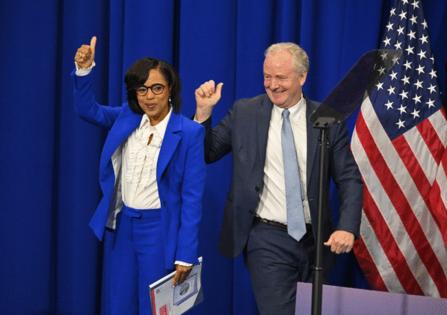Over 12,000 join Maryland call about cuts in Trump's 'One Big, Beautiful Bill'
Published in Political News
WASHINGTON — Maryland residents want to know: What’s in the “One Big, Beautiful Bill”?
That was the question reiterated repeatedly by a bundle of callers during Sens. Chris Van Hollen and Angela Alsobrooks’ telephone town hall on Thursday, referring to the partisan spending package currently stuck in the Senate, where Republicans continue to disagree on parts of the bill.
Both senators took the time to explain the cuts and changes within the shifting legislation. This week, pieces of the bill have been considered by the Senate parliamentarian, who determines whether each provision adheres to the procedural rules that allow the bill to pass with only a simple majority of 51 votes.
As of Thursday morning, the parliamentarian had removed several pieces — including some that experts say will result in residents losing Medicaid — to the Republican bill. One caller asked what the removals were and if some of the “really bad ones” had been taken out.
But by Thursday night, some of those — including a provision that precludes undocumented citizens from the Supplemental Nutrition Assistance Program — had been reinstated and approved with different language.
It’s not certain that the stripped provisions will remain out of the spending package, Van Hollen said during the call. Republicans are confident that adjusting the language of other cut provisions will earn the parliamentarian’s approval. But, until they are approved, Democrats are counting the removed pieces as long-sought policy wins — even as they message against the overall policy package.
“We’ve knocked out a lot of these bad bills,” Van Hollen said. “But I have to just end this question by emphasizing: This is still a terrible, terrible bill that will do huge damage.”
Trump defended the bill on Thursday during a White House press conference, which was promoting the bill.
“We have no money for the border if we don’t pass this bill,” Trump said.
“This is the largest tax cut in the history of our country,” he added. “We’re cutting $1.7 trillion dollars in this bill, and you’re not gonna feel any of it. And your Medicaid is left alone. It’s left the same. Your Medicare and Social Security are strengthened. We’re not cutting. The Democrats are gonna destroy all three of them because it’s not sustainable.”
Other callers asked about a provision that would have prevented the executive branch officials from being held in contempt of court (the parliamentarian didn’t approve it for the Senate bill), a provision that prevents state regulation of artificial intelligence for 10 years and the status of the clean-energy tax credits that the bill would eventually end.
“We are still trying to raise this issue with the parliamentarian,” Van Hollen said about the credits. “That process is ongoing.”
Over 12,000 people joined the call, according to Van Hollen’s office. Advertised as a town hall to answer questions and provide updates on the bill, both senators spoke and then alternated answering questions for over an hour.
Some callers ditched the bill questions to raise other concerns: funding cuts at NASA, Democratic resistance before the midterm elections and restoring funding to the National Institutes of Health.
“This is another case where I do hope that there’ll be bipartisan resistance in the Senate,” Van Hollen said, referring to funding NIH.
And others just wanted advice on civic engagement.
“I want to be active and participate and do whatever I can to stop this madness,” one caller said. “And I’d like guidance if you could provide it.”
“Staying engaged and making sure we’re successful in the midterms is going to be important,” Alsobrooks told the caller. “I also will say that the engagement has already started to work. So keep your foot on the gas.”
Aside from parliamentary arguments, there is little Democrats can do to stop Republicans from passing their omnibus spending bill. In its current iteration, the bill is being continually adjusted, with ongoing discussions about potential cuts that could impact rural hospitals.
The spending package includes a host of Trump’s legislative priorities. It would extend his 2017 tax cuts — and also include tax breaks on overtime wages and a “no tax on tips” provision — while approving billions in border security and Defense spending.
It would also cause millions of Americans to lose healthcare and shift part of the cost of SNAP benefits to the states, and experts predict it would increase the national debt.
-------------------
©2025 The Baltimore Sun. Visit at baltimoresun.com. Distributed by Tribune Content Agency, LLC.

























































Comments